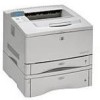HP 5100tn Printer Job Language - Technical Reference Manual - Page 38
Universal Exit, Language UEL, Command
 |
View all HP 5100tn manuals
Add to My Manuals
Save this manual to your list of manuals |
Page 38 highlights
Universal Exit Language (UEL) Command The Universal Exit Language (UEL) Command causes the printer to exit the active printer language. The printer then returns control to PJL. Note Use the UEL command at the beginning and end of every PJL job. You do not need a UEL command before every PJL command. The examples demonstrate using this command. Syntax: %-12345X Parameters: The UEL command does not use any parameters. Comments: The UEL command is a data stream sequence recognized by all printer languages in PJL printers. The UEL command instructs the active printer language to finish processing the current job and relinquishes control to PJL. If PJL is active, any unprocessed PJL commands are discarded and the printer is ready to accept the next PJL command. Note If the printer is processing a PostScript job and TBCP is enabled, the UEL command causes the printer to exit PostScript and enable PJL. Remember that: All jobs must start and end with the UEL command. Printers that support I/O switching use the UEL command as one way to determine job boundaries, indicating when to perform I/O switching (see the "Timeouts" section in Appendix A). At the beginning of a PJL job, the PJL command prefix (@PJL) must immediately follow the UEL command. If the printer receives any characters, spaces, or control codes before @PJL, it enables the default printer language and processes the job in that printer language 4-2 Kernel Commands















